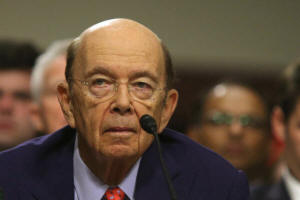|
The U.S. Senate
voted 72-27 to confirm the 79-year-old corporate turnaround
expert's nomination, with strong support from Democrats.
Ross is set to become an influential voice in Trump's economic
team after helping shape the president's opposition to
multilateral free trade deals such as the now-scrapped
Trans-Pacific Partnership.
Ross drew votes from 19 Democrats and one independent, partly
because of an endorsement from the United Steelworkers union for
his efforts in restructuring bankrupt steel companies in the
early 2000s, which saved numerous plants and thousands of jobs.
Ross was criticized by some Democrats as another billionaire in
a Trump Cabinet that says it is focused on the working class,
and for being a "vulture" investor who has eliminated some jobs.
Reuters reported last month that Ross's companies had shipped
some 2,700 jobs overseas since 2004.
The investor will oversee a sprawling agency with nearly 44,000
employees responsible for combating the dumping of imports below
cost into U.S. markets, collecting census and critical economic
data, weather forecasting, fisheries management, promoting the
United States to foreign investors and regulating the export of
sensitive technologies.
While commerce secretaries rarely take the spotlight in
Washington, Ross is expected to play an outsize role in pursuing
Trump's campaign pledge to slash U.S. trade deficits and bring
manufacturing jobs back to America.
Trump has designated Ross to lead the renegotiation of the North
American Free Trade Agreement with Mexico and Canada, a job that
in past administrations would have been left to the U.S. Trade
Representative's office.
Ross will join other major players on the economic team,
including Treasury Secretary Steven Mnuchin and Gary Cohn,
director of the White House National Economic Council.
Some experts said Ross could serve as a counterweight to
advisers such as Peter Navarro, the University of
California-Irvine economics professor who heads Trump's newly
created White House National Trade Council. Navarro has
advocated a controversial 45 percent across-the-board tariff on
imports from China that Trump threatened during his campaign.
"I expect that Ross will quickly become the administration’s
chief trade spokesman, and that Navarro’s influence will be felt
indirectly, rather than through public statements or testimony,"
said Gary Hufbauer, a senior fellow and trade expert at the
Peterson Institute for International Economics.
At his confirmation hearing, Ross downplayed chances of a trade
war with China, while calling it the "most protectionist" large
economy. He vowed to level the playing field for U.S. companies
competing with Chinese imports and those trying to do business
in China's highly restricted economy.
Ross, estimated by Forbes to be worth $2.9 billion, built his
fortune in the late 1990s and early 2000s by investing in
distressed companies in steel, coal, textiles and auto parts,
restructuring them and often benefiting from tariff protections
put in place by the Commerce Department.
(Reporting by David Lawder; Editing by Cynthia Osterman and
Peter Cooney)
[© 2017 Thomson Reuters. All rights
reserved.] Copyright 2017 Reuters. All rights reserved. This material may not be published,
broadcast, rewritten or redistributed.
 |
|






